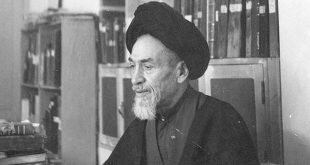
Born
Ayatollah Jannaati was born in Shahrud in the year 1311 A.H. (1932 A.D.).
He was 6 years of age when his noble father sent him to school to learn the Quran and Persian literature. At 11 he entered the Islamic seminary of Shahrud where he finished preliminary levels as well as part of the graduate level (known as Sath) within four years. He was in his 18 when he finished the higher levels of Jurisprudence and Osul (principles) along with Sabzevaari’s ‘Sharhe Manzume’ (Commentary on a Philosophical Poem) whereupon he migrated to Mashhad and benefited profusely from teachers of the city’s religious Seminary.
Emigration to Qum
After sometimes, he traveled to Qom where he attended Kharej lectures on Jurisprudence and Osul (Principles) given, respectively by Ayatollah Brujerdi and Ayatollah Khomeini.
Emigration to Najaf
He later traveled to the holy city of Najaf and settled there in the theological center for 25 years during which he benefited from many prominent scholars such as Ayatollah Shahrudi, Ayatollah Hakim, Ayatollah Shiraazi, Ayatollah Helli, Ayatollah Zanjaani, and Ayatollah Khoei.
Teaching
Parallel to learning he also started teaching (Rasaael) and ‘Sharhe Loma’ and writing on various subjects. He taught the advanced graduate level (Rasaael, Makaaseb and Kefaaye) three times within eleven years at Najaf’s Hawzah. In recent years of his stay in Najaf, Ayatollah Jannaati was also teaching Osul (principles) at the Khaarej level in late Akhund Khorasani’s madrasa (Islamic seminary).
Return to Qum and His Activities
On his return to Qom in 1979, he continued teaching, compiling books, and writing scientific articles. He has been teaching jurisprudence and Osul (Principles) at the post graduate level (Khaarej) in the current traditional manner and also Jurisprudence, Osul (Principles), Quran and Hadith sciences in a comparative method.
He is the first scientific figure who has taught Jurisprudence, Osul (principles), Hadith and Quran sciences in a comparative manner from the view points of 22 sects of 138 sects which exist in the history of Islamic Jurisprudence (Imami, Hanafi, Maliki, Shafei, Hanbali, Zaidi, Ibazi, Zahiri, Ozaiyi, Thoriyi, Leythiyi, Rahoviyi, Nakhaiyi, Tamimi, Tabariyi, Jabariyi, Kalbiyi, Shobramiyi, Ibne Abi Layla, Zuhariyi, Oyayniyi and Jorayhiyi).
His lectures have been gathered into collections and printed under various titles such as comparative jurisprudence, sources of Ijtihad, periods of Ijtihad, periods of jurisprudence and Haj rituals in view of Islamic religions and some of his lectures on Hadith and Quran sciences are being made ready for printing. His works and scientific opinions have been published in various languages and into dozens of books and hundreds of articles, lectures and interviews in and out of the country.
Ayatollah Jannaati has thus far given lectures in many scientific forums and congresses held in and out of Iran. He has had many interviews with indoor and foreign newspapers and magazines in which he has elaborated his views, opinions and fatwas (edicts or rulings) in detail. To mention a few, regardless of cities and universities of Iran, he has presented articles and speeches in Birmingham University, Istanbul University, Damascus University, Makkah and Madinah.
Many newspapers, magazines and periodicals in Iran, Pakistan, India, France, England and U.S. have published His Eminence’s fatwas (edicts or rulings) and opinions. Some of them are named as under: Kayhan, Ettelaat, Iran, Jumhuri Islami, Abraar, Qods, Resaalat, Besat, Salaam, Jahan Islam, Kayhan Havaaei, Hamshahri, Tehran Times, Kayhan Andishe, Kayhan Farhangi, Zan, Mirase Javidan, Zaer, Mighat Haj, Mashhad Seminary Thought, Farzaane, Nur-e-Ilm, Tebyan, Adabestaan, Kowthar, Peyke Yaran, Mahan, Iran Javan, Sorush, Al-Adl, Sawt Al-Islam, Thaqafa al-Islamiya, Fikr Al-Islami, Al-Tawhid, Muballigh Al-Resali, etc.
He has made constant researches on several new issues and has elaborated them with regards to prevailing circumstance, norms and need of the society and on the basis of jurisprudential principles and basic inference elements. The research works have been delivered and presented in different scientific gatherings, cultural and press centers. This very outstanding feature of His Eminence, has given him a high place among prominent scholars in Najaf and Qom. With his profound thoughts he has been and is of a great help to researchers in the field of jurisprudence.
Works
When in Najaf, he wrote several books including a summary of Ayatollah Shahrudi lectures on jurisprudence. He wrote this book in five volumes and presented it to the seekers of jurisprudential knowledge.
Ayatollah Jannaati also has many new ideas some of which are: The role of time and place in jurisprudence, women and permissibility of holding judicial positions, women and permissibility of holding the position of a religious authority and all other political and social duties, the intrinsic cleanness of man, permissibility of eating meat of animals slaughtered by People of the Book, permissibility of mighat (fixed place for Ehram) from Adna al-Hel, permissibility of statuary as an art, indeterminacy in the age of girls’ puberty (the only sign being the monthly period), and also his opinions on music, art and Hijab (women’s dress).
In his Risalah (book containing practical laws) which consists of more than 3000 issues, he has given frank and clear-cut fatwas on the precautionary issues existing in Risalah of other Jurisprudents. More than a hundred such rulings based on precaution (Ehtiyaat), according to other Jurists, have been made frank by him. He has given his clear and decisive opinion on each issue. Also his book, Haj Rituals, with more than 1400 issues is the biggest and most complete book on the rituals of Haj.
 Ijtihad Network Being Wise and Faithful Muslim in the Contemporary World
Ijtihad Network Being Wise and Faithful Muslim in the Contemporary World
